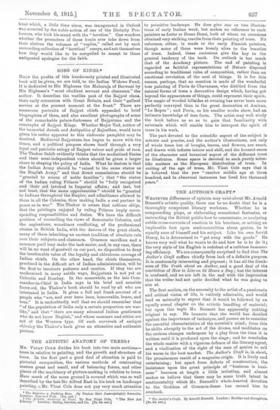SONS OF KINGS.* HALF the profits of this handsomely printed
and illustrated book will be given, we are told, to the Indian Widows Fund. It is dedicated to His Highness the Maharaja of Barwani by His Highness's " most obedient servant and clansman" the author. It describes the warlike past of the Rajput clans, their early connexion with Great Britain, and their " gallant service at the present moment at the front." There are numerous portraits of Rajput chiefs appended to brief biographies of them, and also excellent photographs of some of the' remarkable palace-fortresses of Rajputana and the cenotaphs of Rajput Kings. Whether Major Tod, author of the immortal Annals and Antiquities of Rajasthan, would have given his entire approval to this elaborate pamphlet may be doubted. Mediaeval Rajputana has begun to move with the tunes, and a political purpose shows itself through a very loyal and patriotic eulogy of Rajput valour and pride of race. The Thakur Sahib evidently thinks that the mediatized States and their semi-independent rulers should be given a larger share in shaping the policy of India. What he desires is that the Indian Army should be "raised to the same status as the English Army," and that direct commissions should be " granted to scions of noble families "; that " the status of the Indian ruling Princes " should be "fully recognized and their aid invoked in Imperial affairs ; and last, but not least, that the same opportunities " should be "granted to Indians throughout the Empire, and admittance allowed to them in all the Colonies, thus making India a real partner in peace as in war." The Thakur is aware that noblesse oblige, that the privileges enjoyed by ruling Princes imply corre- 'Tending responsibilities and duties. We have the difficult problem of reconciling the views of democratic Colonies, and the aspirations, sometimes conflicting, of the professional classes in British India, with the desires of the great chiefs, many of them inheriting-an ancient tradition of absolute rule over their subjects and clansmen. Common sacrifices and a common peril may make the task easier, and, in any case, there will be no want of goodwill on our part, no disposition to deny the inestimable value of the loyalty and chivalrous courage of Indian chiefs. On the other hand, the chiefs themselves, practised in the difficult art of Indian administration, will be the first to inculcate patience and caution. If they too are modernized in many subtle ways, Rajputana is not yet as Calcutta and Bombay. In the meanwhile, as the late Com- inander-in-Chief in India says in his brief and sensible foreword, the Thakur's book should be read by all who are interested in India. It gives a full and frank account of a people who "are, and ever have been, honourable, brave, and true." It is undoubtedly well that we should remember that "of the population of India only a certain proportion are war- like," and that " there are many educated Indian gentlemen who do not know English," and whose manners and ethics are not of the Western type. Of such survivals of antique chivalry the Thakur's book gives an attractive and authentic picture.
















































 Previous page
Previous page